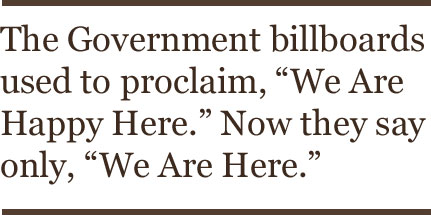The 9-year-old Cuban boy with the cataract in his eye showed me the condoms he had used as balloons at his birthday party. He pulled out the single stick of gum he’d been chewing for a week. He brought over the two tattered photo albums he’d stuffed with pieces of Carnation labels, stickers that said “Knorr’s Soup” and ads for Nescafe — status symbols in the Havana fourth grade. His mother, a policewoman and a staunch Fidelista who refused to accept gifts from a visitor, proudly pointed out photos of her cousins’ suburban home and Nissan in Miami.
Everyone in Cuba knows that the country is bankrupt; everyone knows that almost anything must be better than the steady supply of nothing that the Government offers. Everyone can see that the whole island is shuddering to a halt, like the 40-year-old Plymouths that line the streets of a city where gasoline is illegal. Prostitution, which was scarcely visible (if only for security reasons) five years ago, is pandemic now: the tourist hotels are filled with Cuban teen-agers reddening their lips with children’s crayons.
 The Government billboards used to proclaim, “We Are Happy Here.” Now they say only, “We Are Here.” The official currency is more or less the dollar. And while more and more people turn to santeria, the Cuban equivalent of voodoo, as a source of miracles, the offerings of food they leave out in the streets for the gods are all too often filched by hungry neighbors.
The Government billboards used to proclaim, “We Are Happy Here.” Now they say only, “We Are Here.” The official currency is more or less the dollar. And while more and more people turn to santeria, the Cuban equivalent of voodoo, as a source of miracles, the offerings of food they leave out in the streets for the gods are all too often filched by hungry neighbors.
It would not take an ironist to see that after 35 years of revolution, Fidel Castro has succeeded in turning his land into precisely the kind of Babylon he once came to scourge: a nest of brothels and drugs, dependent on foreign income, where the greatest symbols of power are visiting capitalists.
Yet Cubans have been living off next to nothing for decades. On my annual visit to the island in February, I was struck by the fact that the typical income was down to $1.30 a month, and yet this still seemed enough to put food on the table. Friends kept talking about the Golden Age — before the collapse of the East Bloc in 1989; I didn’t remind them that they had been delivering much the same elegies in 1987.
Sometimes it seems as if the country’s psychological reserves may be emptying: “Before, we could blame everything on the Soviets,” one friend told me. “But now the Soviets are gone, and things are worse than ever.” But just as often, people noted that at least there was nobody starving on the streets.
 It is easy to forget, amid the dramatic images of people risking their lives to flee in makeshift boats, that Cubans have had a crash course in suffering and sacrifice for decades now. They have developed reserves of resourcefulness and patience that would put the rest of us to shame.
It is easy to forget, amid the dramatic images of people risking their lives to flee in makeshift boats, that Cubans have had a crash course in suffering and sacrifice for decades now. They have developed reserves of resourcefulness and patience that would put the rest of us to shame.
Nearly all of them are seasoned experts at making do and finding ways around the system: trading a little tomato sauce for the promise of some rum, fixing a TV in exchange for a kiss. A tourist hustler I know once invited me to his flat for a dinner of lobster and Champagne. (Now he’s serving a year’s sentence in a labor camp for trading dollars. It wasn’t so bad, he told me with a smile when I visited — food was guaranteed there, and he was allowed to go home every six weeks.)
All of us know — and every Cuban knows — the ironies of a country with well-trained doctors and no medicine, with a highly educated population and no books. Yet what such miseries obscure is that for many Cubans, the alternatives to their all-too-familiar leader are not bright. More than half of all Cubans have known no other president, causing many to prefer the devil they know to the devil they don’t.
They look at his lieutenants, and see all of his severity and little of his intelligence; they look across the water to Miami, and see the people who held them down before, they feel, waiting to reclaim their mansions. They note with bitterness that gusanos — the “traitors” who fled, many of them in the Mariel boat lift — can now return to the island and be treated as royalty (foreigners with money!).
But they also acknowledge that their leader has made their tiny island, half as populous as Mexico City, a forceful player on the world stage. As in Vietnam, impatience with Marxism is mixed with a genuine, and often fervent, nationalism. There are many who would still prefer a self-ruled Cuba to one that’s tarted up.
Most Cubans realize that those who flee the country know almost nothing of what they’re going to, beyond what they’ve seen in foreign magazines. And those who arrive in the land of “Dynasty” dreams with little English and no training in a carrot-and-stick economy often end up in the poorest areas of Miami or New York, hustling drugs or joining gangs. One friend I know who made it here as a political refugee quickly wrote back to his equally restless friends in Havana to stay put: America was not for the weak, he said, and — believe it or not — the reports of homelessness and poverty were true!
The most recent letter I got from Cuba, last week, said, “I would like to see the end of this bad dream: no food, no medicine, no transportation, no electricity, no water . . . .” Yet the writer, an actress, concluded, “My country is in crisis, but I am not.”
Americans are wise to see the thousands of Cubans taking to the seas as exemplars of a widespread dissatisfaction with a country that asks everything of its people and gives almost nothing in return; but we would be wiser still to recall the many millions more who, through inertia or trepidation or even a kind of qualified patriotism, choose to sit things out.

